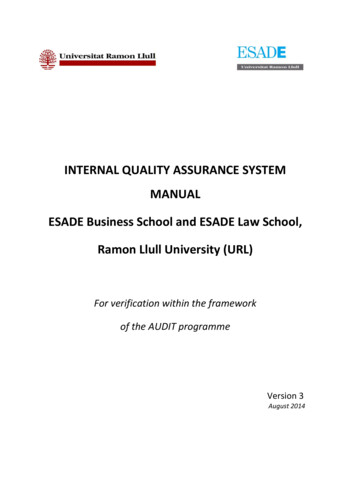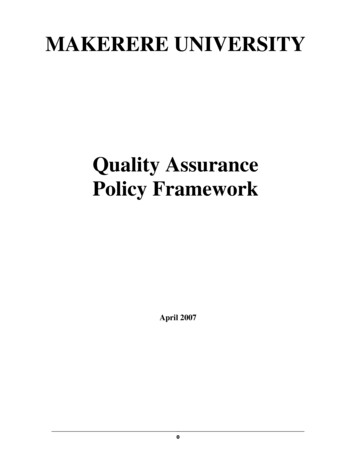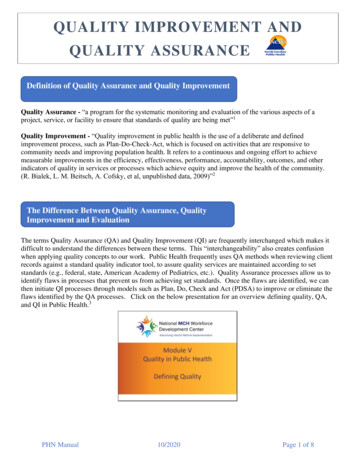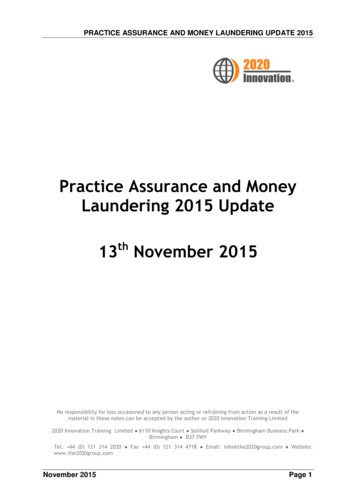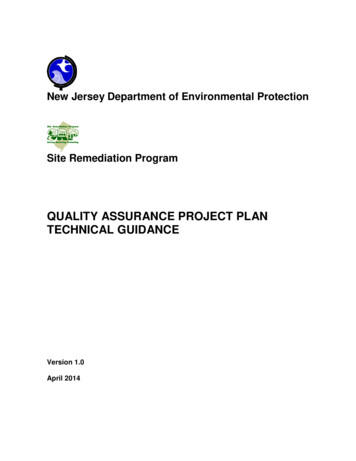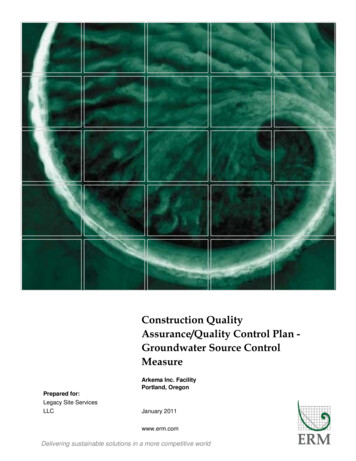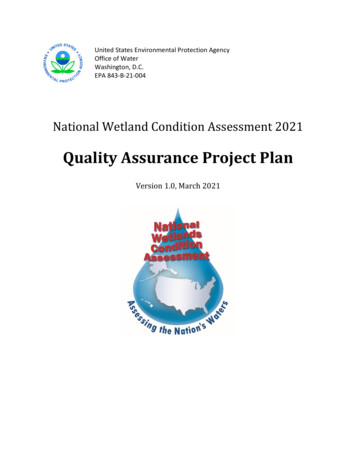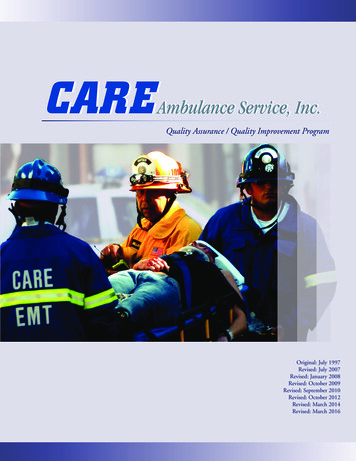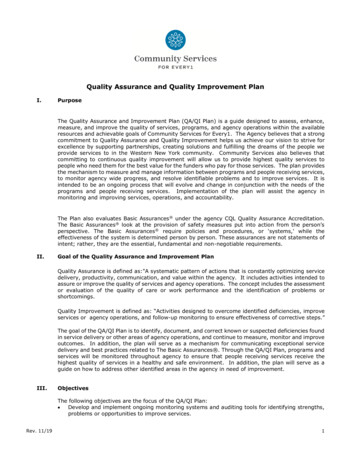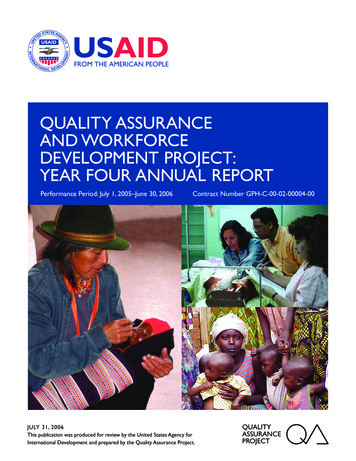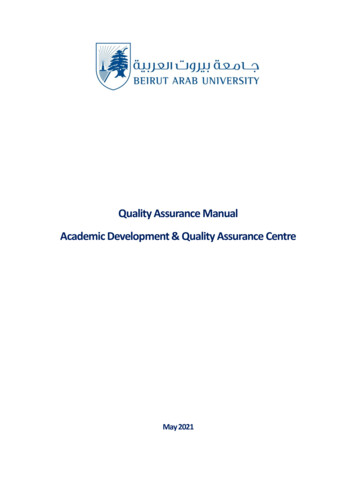
Transcription
Quality Assurance ManualAcademic Development & Quality Assurance CentreMay 2021
Table of ContentsGlossary of Terms . 2Glossary of Abbreviations . 7Chapter One . 8Overview . 8I.Introduction . 8II.Historical Background of Quality Assurance at BAU . 8III.Mission, Vision and Objectives . 8IV.Dean of Academic Development and Quality . 9V.University Quality Assurance Committee. 10VI.Faculty Quality Assurance Unit . 12VII.Quality Assurance and Accreditation at BAU . 13VIII.Programmes International Accreditation . 14IX.Institutional International Accreditation . 15Chapter Two . 18Quality Assurance at Beirut Arab University . 18I.Internal Quality Assurance: . 18Chapter Three . 20Internal Quality Assurance System at BAU . 20I.Introduction . 20II.Quality Management. 20III.Quality enhancement . 21IV.Internal Quality Audit at BAU . 22V.Internal Evaluation Areas: Standards, Indicators and Guidelines . 23DYNAMICS AND QUALITY . 32Chapter Four . 34External Quality Assurance at BAU . 34I.Introduction . 34II.External Evaluation at the Institutional Level . 35III.External Evaluation at the Programme Level . 44IV.Quality Assurance and Accreditation Agencies . 46Appendices . 47References . 481 BAU Quality Assurance Manual 2021
Glossary of TermsAcademic audit: Academic audit is a review process that focuses on the procedures auniversity or a college uses to assure its academic standards and quality. It evaluateshow the university or college satisfies itself that its chosen standards are beingachieved and makes a judgment about threshold standards.Academic quality: Academic quality describes how well the learning opportunitiesavailable to students help them to achieve their award. It is about making sure thatappropriate and effective teaching, support, assessment and learning opportunitiesare provided.Academic standards: The level of achievement a student has to reach to gain anacademic award. This level should be comparable to similar programmes. Externalexamining is one way of maintaining these standards within universities and colleges.Accreditation: Accreditation is the establishment or of the status, legitimacy orappropriateness of an institution or program of study.Accreditation body: An accreditation body is an organization delegated to makedecisions, on behalf of the higher education sector, about the status, legitimacy orappropriateness of an institution, or programme.Accreditation duration: Accreditation decisions are usually limited to a fixed andstated period, after which the institution or programme is required to engage with amore or less rigorous re-accreditation process.Agency: Agency is, in the context of quality in higher education, shorthand for anyorganization that undertakes any kind of monitoring, evaluation or review of thequality of higher education.Assessment: A general term that embraces all methods used to judge theperformance of an individual, group or organization.Assessment of student learning: Assessment of student learning is the process ofevaluating the extent to which participants in education have developed theirknowledge, understanding and abilities.Assessment of teaching and learning: Assessment of teaching and learning is theprocess of evaluating the quality and appropriateness of the learning process,including teacher performance and pedagogic approach.Assurance: Assurance of quality in higher education is a process of establishingstakeholder confidence that provision (input, process and outcomes) fulfilsexpectations or measures up to threshold minimum requirements.2 BAU Quality Assurance Manual 2021
Audit: Audit, in the context of quality in higher education, is a process for checkingthat procedures are in place to assure quality, integrity or standards of provision andoutcomes.Audit report: An audit report is a codification of the process, findings and outcomesof the audit process, usually prepared by the auditors and project team.Bloom’s Taxonomy: It is a classification of educational objectives and outcomes byusing action verbs. Bloom’s Taxonomy can be used for everything from lesson planningand Rubric making to curriculum mapping and more. Bloom’s Taxonomy begins withlower-order thinking skills (LOTS) with Remembering, and ends with higher-orderthinking skills (HOTS) with Creating.Credit: Recognition of a unit of learning, usually measured in hours of study orachievement of threshold standard or both.Credit transfer: Credit transfer is the ability to transport credits (for learning) from onesetting to another.Criteria: Criteria are the specification of elements against which a judgment is made.Curriculum: Curriculum is the embodiment of a program of learning and includesphilosophy, content, approach and assessment.Degree: Degree is the core higher education award, which may be offered at variouslevels from foundation, through bachelors, masters to doctoral.Effectiveness: Effectiveness is the extent to which an activity fulfils its intendedpurpose or function.Efficiency: Efficiency is the extent to which an activity achieves its goal whilstminimizing resource usage.Employability: Employability is the acquisition of attributes (knowledge, skills, andabilities) that make graduates more likely to be successful in their chosen occupations(whether paid employment or not).Evaluation: Evaluation (of quality or standards) is the process of examining andpassing a judgment on the appropriateness or level of quality or standards.Excellence: Excellence means exhibiting characteristics that are very good and,implicitly, not achievable by all.External evaluation: External evaluation is:1. A generic term for most forms of quality review, enquiry or exploration.3 BAU Quality Assurance Manual 2021
2. A process that uses people external to the program or institution to evaluatequality or standards.External examiner: External examining helps universities and colleges compareacademic standards, and ensure that assessment procedures are fair and operated.External examiners comment on student achievement in relation to those standards.Faculty: Faculty is the organizational unit into which cognate disciplines are located ina higher education institution.Faculty review: Faculty review is a process of reviewing the inputs, process or outputsof a faculty as an organizational unit; its structure, mode of operation, mission, aimsand objectives.Fitness of purpose: Fitness of purpose evaluates whether the quality-relatedintentions of an organization are adequate.Graduate: A graduate is someone who has successfully completed a higher educationprogram at least at bachelor degree level.Higher education: Higher education is usually viewed as education leading to at leasta bachelor's degree or equivalent.Higher education institution: A publicly designated and autonomous institution,which provides higher education; a university, institute, university college or collegeof higher education.Impact: Impact in the context of quality in higher education refers to theconsequences that the establishment of quality processes, (both internal andexternal), has on the culture, policy, organizational framework, documentation andinfrastructure. Also, on learning and teaching practices, assessment/grading ofstudents, learning outcomes, student experience, student support, resources,learning and research environment, research outcomes and community involvementof an institution or department.Institution: Institution is shorthand for institution of higher education, which is aneducational institution that has students graduating at bachelor degree level or above.Internal evaluation: Internal evaluation is a process of quality review undertakenwithin an institution for its own ends.Learning outcome: A learning outcome is the specification of what a student shouldlearn as the result of a period of specified and supported study.4 BAU Quality Assurance Manual 2021
Lifelong learning: Lifelong learning is all learning activity undertaken throughout life,whether formal or informal.Course/Module specification: Course/Module specification is statement of the aims,objectives/learning outcomes, content, learning and teaching processes, mode ofassessment of students and learning resources applicable to a unit of study.Monitoring: Monitoring has two meanings:1. The specific process of keeping quality activities under review.2. A generic term covering all forms of internal and external quality assuranceand improvement processes including audit, assessment, accreditation andexternal examination.Objective: An objective is:1. A specific statement about what students are expected to learn or to be ableto do because of studying a programme: more specifically this is a learningobjective.2. A measurable operationalization of a policy, strategy or mission: this is animplementation objective.Outcomes: Outcome is:1. Shorthand for the product or endeavors of a higher education institution (orsector), including student learning and skills development, research outputsand contributions to the wider society locally or internationally (institutionaloutcomes).2. Shorthand for learning outcome.Performance indicators: Performance indicators are data, usually quantitative inform, that provide a measure of some aspect of an individual's or organization’sperformance against which changes in performance or the performance of others canbe compared.Process: Process, in the context of quality, is the set of activities, structures andguidelines that:1. Constitute the organization or individual's procedures for ensuring their ownquality/standards.2. Constitute the mechanism for reviewing or monitoring the quality or standardsof another entity.Programme accreditation: Programme accreditation establishes the academicstanding of the programme or the ability of the programme to produce graduates withprofessional competence to practice.5 BAU Quality Assurance Manual 2021
Programme evaluation: Programme evaluation is a process of reviewing the qualityor standards of a coherent set of study modules.Programme specification: A programme specification documents the aims, objectivesor learning outcomes, programme content, learning and teaching methods, processand criteria for assessment, usually with indicative reading or other reference materialas well as identifying the modules or subunits of the programme, setting out core andoptional elements, precursors and levels.Provision: Is an all-encompassing term that refers to the learning opportunities,research and community activity offered/undertaken by an institution of highereducation.Quality assurance: All the systems, resources and information devoted to maintainingand improving standards and quality. It covers teaching and learning opportunities,and student support services.Recognition: Recognition is the formal acknowledgement of the status of anorganization, institution or programme.Report: Report (n.) is the documented outcome or results of an evaluation process.Review:1. Review is generic term for any process that explores the quality of highereducation.2. Review refers to explorations of quality that do not result in judgments ordecisions.Review team: The review team is the group of people undertaking a qualitymonitoring or evaluation process.Rubric: is a guide listing specific criteria for grading or scoring tests, academic papers,and projects.Self-assessment: Self-assessment is the process of critically reviewing the quality ofone’s own performance and provision.Site-visit: Is when an internal/external evaluation team goes to an institution toevaluate verbal, written and visual evidence.Stakeholder: A stakeholder is a person (or group) that has an interest in the activitiesof an institution or organization.Unit: Unit in the context of quality in higher education is the generic name for aquality-monitoring department internal to an institution.6 BAU Quality Assurance Manual 2021
Validation: Validation is a process of confirming that an existing programme of studyor a newly designed one can continue or commence operation.Glossary of AbbreviationsADQACAcademic Development & Quality Assurance CentreBAUBeirut Arab UniversityEQAExternal Quality AssuranceFIBAAFoundation for International Business AdministrationAccreditationFQAUFaculty Quality Assurance UnitIQAInternal Quality AssuranceILOsIntended Learning OutcomesKPIsKey Performance IndicatorsQAQuality AssuranceQAMQuality Assurance ManualQASQuality Assurance SystemQMSQuality Management SystemSBLStudent-Based LearningSQACStudent Quality Assurance CommitteeUQACUniversity Quality Assurance CommitteeUQAUUniversity Quality Assurance Unit7 BAU Quality Assurance Manual 2021
Chapter OneOverviewI.IntroductionBeirut Arab University (BAU) is committed to provid students with a richeducational experience in a supportive learning environment designed to preparethem to meet the highest international standards. Academic quality is a criticalpart of the University's self-assurance, accreditation, and compliance systems.The establishment of academic quality ensures that the University continues torealize its ambitious mission and attain its strategic objectives.The contents of the Quality Assurance Manual (QAM) clearly describe how allquality assurance activities are integrated into a single system to continuallyappraise and improve BAU programmes, services, and operations.II.Historical Background of Quality Assurance at BAUThe quality assurance system at BAU started as an initiative in 2007 and became aformal structure in 2008. The University Quality Assurance Unit was constituted asa part of the Academic Development Center of the University. This was followedby establishing a Quality Assurance Unit in each Faculty.In 2010, a University Quality Assurance Committee (UQAC) was established toprovide Faculties with guidance and assistance in the process of implementing andachieving their own quality assurance work.In 2015, BAU restructured the Academic Development and Quality AssuranceCentre (ADQAC) under the supervision of the Dean of Academic Development andQuality to handle quality assurance work at the University.III.Mission, Vision and Objectives1. MissionCommitment to develop, monitor and follow up the implementation of plansfor teaching and learning, scientific research and community services,according to the international quality assurance standards of higher education.2. VisionAchieving excellence in Quality assurance procedures in all University domains.3. Objectives and Responsibilities8 BAU Quality Assurance Manual 2021
The BAU quality assurance system, in alignment with University’s strategy,aims at enhancing the capacity building of BAU academic staff, developing andapplying quality assurance procedures for successful learning, and obtainingvarious job opportunities in different domains. It also aims at promotingcooperation with international educational bodies. Accordingly, itsresponsibilities were updated in 2018 as follows:a. Assisting the University to achieve its mission and vision.b. Periodically reviewing the “Quality Manual” to explain theprocedures required for the implementation of the qualityassurance system of the University. Also, to ensure its continuedappropriateness to quality assurance of education at HEI’s.c. Promoting the cooperation with international educational bodies inorder to enhance the capacity building of BAU’s academic staffespecially the quality in teaching and learning.d. Promoting the “Student-Centered Learning”.e. Providing Faculties with technical support on the use of up-to-dateand appropriate techniques in teaching and learning process.f. Following-up the Faculties’ action plans to fulfill the comments andrecommendations of the international accreditation bodies for therenewal of accreditation of the programmes.g. Organizing and participating in seminars, workshops and trainingsessions related to quality assurance activities inside and outsidethe University.h. Following-up the academic advising process, and monitoring it at allFaculties.i. Interviewing students from all levels to see their views on thequality of education, curricular and extracurricular activities.j. Preparing a “Self-Assessment Report” periodically, aiming atreviewing the effectiveness of “Internal Quality Assurance System”at BAU.IV.Dean of Academic Development and QualityThe Dean of Academic Development & Quality is responsible for managing acomprehensive institutional development to include quality assurance,University network, strategic planning and academic development, as thefollowing:- Submitting proposals on issues and strategies relating to overall Universitydevelopment.- Advising and implement effective internal and external managing methodsof communication.9 BAU Quality Assurance Manual 2021
-Ensuring dynamic processes in Faculties’ advisory committees.Ensuring the operation of quality assurance in the University.Supporting the Faculties in programmes accreditation and maintaining theiraccreditation standards.- Preparing and developping the process of institutional accreditation.- Supporting Faculties’ network, nationally and internationally.- Supporting the University in partnership with other national andinternational universities and organizations.- Performing other related duties assigned by the President.The Dean of Academic Development & Quality reports to the President.V.University Quality Assurance CommitteeThe Quality Assurance Committee at the University level was established to handlethe Quality Assurance requirements at BAU.1. Structure of the University Quality Assurance Committee (UQAC) Head of the Committee/ University President Deputy Head/ Dean of Academic Development and Quality Academic Staff/ Members Non-Academic Staff/ Members University PresidentHeadDeputyHeadMembers Dean of Academic Development & Quality Academic Staff Non-Academic StaffFigure 1: Structure of UQAC2. SELECTION CRITERIA OF ACADEMIC STAFFAcademic staff should be skilled people in quality assurance in all faculties basedon many criteria and having the ability and a range of characteristics and attitudesneeded for success of their tasks and responsibilities such as:10 BAU Quality Assurance Manual 2021
----Effective communication is essential; flexibility and adaptability; ease withdiversity; motivation and persistence; high ethical standards; creativity andresourcefulness; open dialogue; and the ability to work with others, especiallyin groups.Individual responsibility and commitment; understand and feel ownership ofthe quality system which are in place for maintaining and enhancing quality;professional commitment based on values of professionalism and trust; selfcritical commitment to maintenance and enhancement of a successful qualityassurance system.Decision making and accountability characteristics; propose changes; theability to make informed judgments and decisions; correctly define problems;gather and analyze relevant information; address the system’s weakestfeatures. Develop and implement appropriate solutions; more than simplyassess quality and equal emphasis must be placed upon communicating theresults of these assessments to interested parties, both to satisfy demands foraccountability and to enable the institution to use the results to affect changesand improvements.Skills; computational skills, technological skills; concise and intelligiblereporting; presentation skills; public communication of its results; widedissemination of results to interested parties through multiple channels ofcommunication.3. Duties and Tasksa. Duties and Tasks of the Deputy Head/ Dean of AcademicDevelopment and Quality- To set up criteria for the internal auditing and implement a strategy that ensureenhancement of quality assurance and its applications;- To monitor the validity of the educational input and the quality of theeducational output;- To set-up the action plans of quality development;- To lead the internal audit on-site visits to all Faculties and Branches;- To develop plans concerning the quality of overall performance of theeducational process;- To review the benchmarks of international accreditation agencies and decidethe extent to which these are acknowledged in Lebanon and internationally;- To offer technical support for the enhancement of quality at all levels;- To prepare and review the procedures for institutional accreditation;- To review the procedures for programmes accreditation.- To ensure the dissemination of quality culture and concept at all domains.b. Duties and Tasks of Academic Staff Members- To disseminate the culture of quality among all academic and non-academiccommunity of the University;11 BAU Quality Assurance Manual 2021
--VI.To provide technical assistance in the on-site visits for all Faculties andBranches;To issue their comments after the on-site visits for all Faculties and Branches;To participate in conferences, seminars, workshops and training sessionsrelated to quality assurance inside and outside the University;To submit a report after attending any conference or activity to share benefitsand experiences.c. Duties and Tasks of Non- Academic Staff MembersOperational Tasks:To act as a point of coordination with faculties and departments;To understand audit and accreditation processes;To provide support to management faculty departments;To accompany and assist the auditors /quality staff in performing their auditand checks;To coordinate, collect and process data from various sources;To maintain quality assurance records.Faculty Quality Assurance Unit1. Structure of Faculty Quality Assurance Unit (FQAU) General Supervisor/ Dean of the Faculty Director of Quality Assurance Unit Academic Staff/ Members Students Quality Assurance Committee (SQAC)GeneralSupervisorDirectorMembersStudents Dean of the Faculty Academic Staff Academic Staff Students Quality Assurance CommitteeFigure 2: Structure of FQAU2. Duties and Tasksa. Duties and Tasks of the Director12 BAU Quality Assurance Manual 2021
----VII.To coordinate with the Dean to follow-up the FQAU affairs;To provide the academic departments at the Faculty with assistance andsupport;To cooperate with academic and non-academic staff at the Faculty level inorder to accomplish and execute all quality assurance work;To hold periodic meetings of the (FQAU), chaired by the Dean. Those meetingsshould be held before Faculty Council meetings.To provide the Faculty with technical support to achieve the internationalaccreditation of its programmes;To be aware of all educational and extracurricular activities at the Faculty level.To raise awareness among academic staff, non-academic staff and studentsabout the application of University’s quality assurance system andinternational accreditation of the Faculty programmes.b. Duties and Tasks of (FQAU) MembersTo participate with the (FQAU) Director in assessing the performance andquality management of the Faculty.To participate with the (FQAU) Director in developing the standards ofperformance to reach the international standards required by theinternational accreditation agencies of the academic programmes in alignmentwith the University internal auditing system.c. Duties and Tasks of (SQAC) MembersTo raise awareness among students about the quality assurance work at theFaculty and the benefits of international accreditation of the Facultyprogrammes.To assist the (FQAU) in its activities as requested.Quality Assurance and Accreditation at BAUAt BAU, quality is a nonstop journey of internal re-evaluations, reflections and redirections towards continuous and sustainable improvements and innovations.Managing internal audit, assessment and accreditation are essential for improving thequality of education and services, education design and delivery to “Fit for Purpose”and to prevent education weaknesses or deviations from international standards.Accreditation success at BAU is based on a strong and sustainable foundation of anInternal Quality Assurance (IQA) system.In this regard, the question is “what to” and “how to” address the requirements of theinternational accreditation bodies by the (IQA) system of the University.The terms ‘what’, ‘when’, ‘where’, ‘who’, and ‘how’ are defined as follows:a. What: Identifies the activities which affect the quality process at differentlevels of the University;13 BAU Quality Assurance Manual 2021
b. When: Indicates the point of time the activity is required to be performed;c. Where: Identifies the location(s) at which the activity is performed;Who: Identifies the individual by title within the University, at any level, thatis responsible for performing the activity, andd. How: identifies the technique (planning & accomplishment) used to achievequality (e.g. procedures, work instructions, forms, etc.).As a result, the university succeeded in getting international accreditation for almostall its programmes as well as for the institution itself.VIII.Programmes International AccreditationBAU is keen to ensure and improve the quality of the offered academic programmesbased on international standards, guidelines and criteria, cope with the breadth ofhuman knowledge and up-to-date technologies and encourage its graduates tocompete for the best job opportunities nationally and internationally.1. Benefits of Programme International Accreditationa. International accreditation assures that a programme has met highquality standards set by the profession;b. International accreditation helps students and their parents choosequality Faculty’s programmes;c. International accreditation enables employers to recruit well-preparedgraduates;d. International accreditation increases competitiveness of accreditedprogrammes;e. International accreditation facilitates the acceptance of students forpostgraduate programmes in international institutions of highereducations;f. International accreditation for BAU programmes is important for theacceptance of the transferred students from other programmes;g. International accreditation ensures and improves the employability andbusiness relevance of the Alumni.2. International accreditation or validation of BAU programmesInternational accreditation or validation are as follows: The Faculty of Human Sciences attained international accreditation for thePsychology programme in February 2017 from the Accreditation Agency inHealth and Social Sciences (AHPGS) until September 2022. The Faculty of Law & Political Science attained accreditation from the Foundationfor International Business Administration Accreditation (FIBAA) in 2016 for itsBachelor, Masters, and PhD programmes until the end of fall semester2021/2022.14 BAU Quality Assurance Manual 2021
IX.The Faculty of Business Administration attained accreditation from theFoundation for International Business Administration Accreditation (FIBAA) in2015 for its Bachelor and MBA programmes until August 2022.In 2012, the Faculty of Architecture-Design & Built Environment was grantedinternational validation by the Royal Institute of British Architects (RIBA) for itsprogramme to be the only internationally accredited architectural programme inLebanon. In 2017, RIBA confirmed Initial validation and full (RIBA) recognition ofpart II (after year 6 - March.) and maintained recognition and reposition of part I(after year 4) effective from 2017 until 2023. In addition, (RIBA) accredited thearchitectural programme of BAU at Tripoli branch a full recognition of part I &part II in 2018 until 2023.The Faculty of Engineering obtained international accreditation in 2013 by theAccreditation Board for Engineering and Technology (ABET) for Electronics andCommunication programme. In additio
3 BAU Quality Assurance Manual 2021 Audit: Audit, in the context of quality in higher education, is a process for checking that procedures are in place to assure quality, integrity or standards of provision and outcomes. Audit report: An audit report is a codification of the process, findings and outcomes of the audit process, usually prepared by the auditors and project team.
